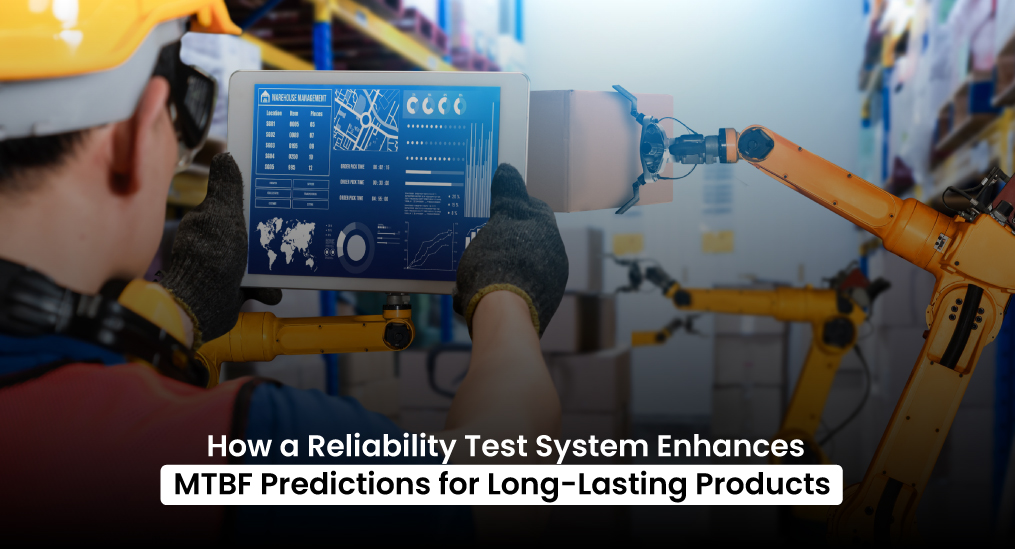Elevate Your Testing with Top Software for Reliability Testing and Analysis
Making sure your products are built to last is a necessity in today’s competitive market. This is why software solutions for reliability testing are a must-have. These tools go beyond traditional testing methods, helping you find potential problems, predict failures, and improve your product’s overall performance.
Why does this matter? Customers expect products they can rely on, and reliability is often what sets great products apart from the rest.
So how can these software tools help? They simplify the testing process, provide valuable insights into potential issues, and save time and resources, allowing you to focus on creating better, more reliable products.
In this article, we’ll take a closer look at the best software solutions for reliability testing, how they work, and the advantages they offer. When it comes to ensuring quality and durability, the right tools can make all the difference.
Key Features of Software Solutions for Reliability Testing

When it comes to reliability testing, the right tools can make all the difference. However, not all software is created equal, and therefore, choosing the best solution depends on your specific project needs. For example, some tools are better suited for large-scale projects, while others may be ideal for more focused applications.
To get the most out of your reliability testing efforts, look for software with the following key features:
1. Robust Modeling Capabilities
A tool that can simulate real-world scenarios is essential for testing how your product will perform under different conditions, such as stress, wear, or environmental factors. By mimicking actual usage, robust modeling helps identify potential issues before they become problems in the real world.
2. Scalable Software Solutions for Reliability Testing Across Projects
Whether you’re testing a single component or an entire complex system, the software should adapt to your needs. A scalable tool allows you to start small and expand as your project grows, ensuring consistent testing across all stages.
3. Advanced Error Detection in Software Solutions for Reliability Testing
Comprehensive error logs and analytics are crucial for pinpointing the root causes of failures. Detailed reports and insights help your team quickly address issues and refine designs for better reliability.
4. Seamless Integration Capabilities
The software should fit into your existing testing ecosystem without creating additional complexity. Integration with other tools and platforms streamlines workflows and ensures a more efficient testing process.
5. User-Friendly Software Solutions for Reliability Testing Teams
A simple and intuitive interface makes it easier for your team to get up to speed and start testing effectively. Reducing the learning curve saves time and ensures your team can focus on the testing itself, not on figuring out the software.
Top Companies & Software Solutions for Reliability Testing and Analysis

Reliability testing is crucial to ensure that products and systems perform consistently and meet high standards over time. Whether you’re looking for expert services or advanced software tools, the right resources can help you identify weaknesses, improve durability, and build trust in your products.
Here are some of the top companies and software solutions for reliability testing:
1. Relteck (Reliability Testing Services)

Relteck is a trusted name in reliability testing services, specializing in electronic products. Their expertise lies in delivering customized solutions to improve product durability, reduce failures, and extend lifespan. Relteck supports clients in achieving high reliability while minimizing maintenance costs.
Key Services:
- MTBF Prediction: Calculates Mean Time Between Failures to identify potential issues and extend product life.
- PCB Sherlock Analysis: Simulates real-world stresses on PCB prototypes using Ansys Sherlock software.
- HALT & HASS Testing: Highly Accelerated Life Testing and Stress Screening to uncover vulnerabilities.
- Environmental Testing: Tests products under harsh conditions to ensure durability and compliance with industry standards.
Relteck is ideal for businesses focused on producing reliable electronic products that meet or exceed industry expectations.
2. ReliaSoft (Reliability Modeling Software)

ReliaSoft is a leading software provider for reliability engineering and modeling, widely used in industries such as aerospace, automotive, and electronics. Its tools offer in-depth analysis to improve dependability and system performance.
Key Features:
- Reliability Prediction Algorithms: Utilizes advanced modeling techniques to forecast system behavior and failure rates over time.
- Root Cause and Stress Analysis: Helps engineers identify the origins of issues and assess how systems respond to stressors like load and wear.
- Customizable Reporting: Allows users to tailor detailed reports to align with specific project requirements, making insights actionable and accessible.
ReliaSoft excels in projects that demand high levels of accuracy and performance, ensuring long-term reliability for complex systems.
3. TestRail (Test Management Software)

TestRail is a comprehensive test management tool that organizes and simplifies testing workflows. While not exclusively designed for testing realibility, its versatility makes it an excellent choice for managing complex testing processes.
Key Features:
- Centralized Test Management: Provides a unified platform for managing all testing activities, ensuring no details are overlooked.
- Customizable Dashboards: Tracks testing progress and reliability metrics in real-time, offering clear visibility into the process.
- Seamless Integration: Easily connects with popular tools like JIRA and Selenium, streamlining workflows for improved efficiency.
TestRail is perfect for teams looking to stay organized and ensure every aspect of their testing strategy is well-executed.
4. Applitools (AI-Driven Testing)

Applitools leverages artificial intelligence to enhance reliability testing for web and mobile applications, focusing on both functional and visual consistency across platforms.
Key Features:
- AI-Powered Testing: Automatically identifies abnormalities in software performance or visual elements, reducing manual effort.
- Cross-Platform Compatibility: Ensures applications function consistently across multiple devices, browsers, and operating systems.
- Reusable Test Scripts: Saves time by automating test scripts designed to identify and prevent reliability issues.
Applitools is ideal for teams working on modern applications that require both speed and precision in testing.
5. Ansys (Advanced Reliability Analysis)

Ansys is a leader in engineering simulation software, providing advanced tools for reliability analysis in multidisciplinary systems. Known for its robust capabilities, Ansys supports both hardware and software projects in engineering-intensive fields.
Key Features:
- Predictive Analytics: Uses sophisticated modeling to predict system failures and behavior under stress, enabling engineers to make data-driven improvements.
- Stress and Load Testing: Identifies weak points when systems are exposed to extreme conditions or heavy loads, ensuring durability.
- CAD Integration: Works seamlessly with CAD tools, making it ideal for projects requiring a combination of hardware and software design.
Ansys is one of the widely used software solutions for reliability testing and industrial applications, where complex systems demand reliable, long-term performance.
How to Choose the Right Reliability Testing Software

Not sure which reliability testing software is right for your needs? Here are a few simple factors to keep in mind:
Project Complexity
If you’re working on a detailed or large-scale project, then it’s wise to choose tools with advanced modeling features, such as RAM Commander. Not only are these tools designed to handle complex systems, but they also provide thorough and actionable insights throughout the development process.
Team Size
For bigger teams with multiple workflows, scalable tools like TestRail are a smart option. They help organize tasks and keep everyone aligned.
Budget
Find a tool that fits your budget but still includes the features you need most. Many affordable options offer great functionality without overspending.
Integration Needs
When selecting reliability testing software, make sure to look for options that integrate well with the tools and systems you already use. After all, smooth integration not only helps you maintain efficiency but also prevents unnecessary disruptions during development.
By focusing on these key points, you’ll be able to choose the reliability testing software that’s the best fit for your project and team.
While the future of robotics looks promising, there are still significant challenges to making these systems consistently reliable. Therefore, addressing these obstacles is crucial to advancing the field. In doing so, we can ensure that reliability engineering in robotics meets the evolving demands of modern applications.
Final Thoughts
Reliability testing is the cornerstone of creating products, systems, and software that stand the test of time. As customer expectations continue to rise, and industries demand greater dependability, it is therefore even more essential to use the right software tools and services for reliability testing. In fact, the right tools can significantly enhance your ability to deliver consistent, high-quality products.
For instance, expert services like MTBF analysis provide valuable insights into potential product failures. Additionally, advanced software solutions such as ReliaSoft, TestRail, RAM Commander, Applitools, and Ansys offer powerful and versatile capabilities tailored to different testing needs.
Moreover, these tools allow teams to identify weaknesses, predict failures, and ensure products perform consistently under real-world conditions. In addition, by integrating these resources into your development process, you can not only meet but also exceed the high standards set by today’s consumers and industries. As a result, your products will be better equipped to deliver long-term reliability and customer satisfaction.
Ultimately, with the right tools and strategies in place, businesses can deliver reliable products that inspire trust and long-term satisfaction. In doing so, they not only meet customer expectations but also build lasting relationships. As a result, they gain a competitive edge in the market and ensure sustained success.






